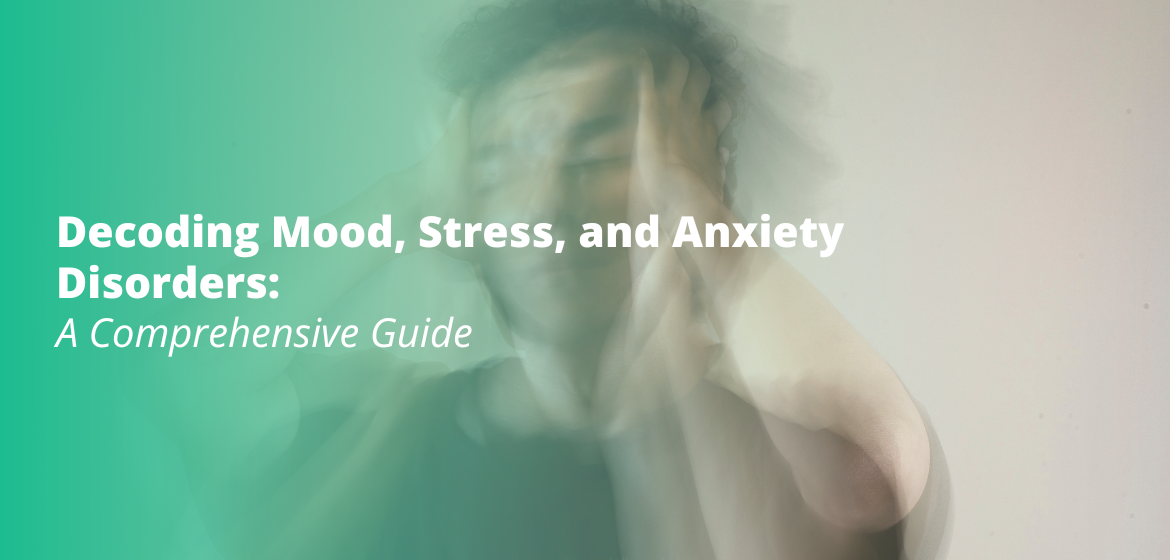
Decoding Mood, Stress, and Anxiety Disorders: A Comprehensive Guide
Mood, stress, and anxiety disorders represent significant and interconnected mental health challenges affecting individuals across various life stages. Understanding their distinct characteristics, the interplay between them, and effective management strategies is vital for both personal well-being and professional practice in helping professions, particularly counselling and psychotherapy. This guide delves into each category, providing a comprehensive overview.
Mood Disorders: The Spectrum of Emotional Disturbances
Mood disorders involve persistent and significant shifts in emotional state, affecting thoughts, behaviours, and overall functioning. They can manifest as:
- Major Depressive Disorder: Characterised by pervasive sadness, loss of interest or pleasure in activities, changes in appetite and sleep patterns, fatigue, difficulty concentrating, feelings of worthlessness, and even suicidal thoughts.
- Bipolar Disorder: Marked by dramatic swings between periods of elevated mood (mania or hypomania) and depressed mood. Manic episodes involve increased energy, impulsivity, racing thoughts, decreased need for sleep, and inflated self-esteem.
- Persistent Depressive Disorder (Dysthymia): A chronic form of depression with milder but persistent symptoms lasting for at least two years. Individuals may experience low energy, poor appetite or overeating, sleep disturbances, and low self-esteem.
Stress: The Body’s Natural Alarm System Gone Haywire
Stress is a natural physiological and psychological response to demands and pressures. While manageable stress can be motivating, chronic or excessive stress takes a toll on both physical and mental health. Contributors to stress include life events, work pressures, relationship difficulties, and financial strain. Prolonged stress can manifest as:
- Physical Symptoms: Headaches, muscle tension, fatigue, digestive problems, weakened immune system, and sleep disturbances.
- Mental Health Issues: Increased risk of anxiety and depression, irritability, difficulty concentrating, and memory problems.
- Behavioural Changes: Changes in eating habits, increased substance use, social withdrawal, and difficulty maintaining relationships.
Anxiety Disorders: When Worry Becomes Overwhelming
Anxiety disorders involve excessive and persistent worry, fear, and apprehension, often disproportionate to the actual situation. They can manifest in various forms:
- Generalised Anxiety Disorder (GAD): Characterised by chronic and excessive worry about everyday life events, even when there’s little or no reason to be concerned.
- Panic Disorder: Involves sudden and intense episodes of fear (panic attacks) accompanied by physical symptoms like heart palpitations, shortness of breath, dizziness, and chest pain.
- Social Anxiety Disorder: Marked by intense fear of social situations and scrutiny by others, leading to avoidance of social interactions.
- Specific Phobias: Irrational and persistent fears of specific objects or situations, such as spiders, heights, or flying.
The Interconnected Web: How Mood, Stress, and Anxiety Interact
These conditions often co-exist and influence one another. Chronic stress can significantly increase the vulnerability to developing both mood and anxiety disorders. Conversely, individuals with mood disorders may experience heightened levels of stress and anxiety. This complex interplay necessitates a comprehensive and integrated approach to assessment and treatment.
Effective Management: A Multi-pronged Approach
Addressing mood, stress, and anxiety disorders typically involves a combination of strategies tailored to individual needs:
- Psychotherapy: Therapeutic modalities like Cognitive Behavioural Therapy (CBT), Dialectical Behaviour Therapy (DBT), and mindfulness-based interventions help individuals identify and modify negative thought patterns, develop coping mechanisms, and manage emotional responses.
- Medication: Psychiatric medications, such as antidepressants, anti-anxiety medications, and mood stabilisers, can be prescribed to manage symptoms and support therapeutic progress.
- Lifestyle Changes: Adopting healthy lifestyle practices, including regular exercise, balanced nutrition, sufficient sleep, stress management techniques (yoga, meditation), and limiting substance use, plays a crucial role in improving mental well-being.
- Support Systems: Connecting with supportive friends, family, or support groups can provide invaluable emotional support and reduce feelings of isolation.
Empowering Future Mental Health Professionals
ICHAS recognises the critical need for skilled and compassionate professionals equipped to address the complexities of mood, stress, and anxiety disorders. Our BA (Hons) in Counselling and Psychotherapy program provides students with a comprehensive understanding of these conditions, evidence-based therapeutic approaches, ethical considerations, and practical skills through extensive clinical training. We empower our graduates to make a meaningful difference in the lives of individuals seeking support and guidance on their journey towards mental wellness. If you’re passionate about mental health and aspire to a fulfilling career in this field, explore the ICHAS program and embark on a transformative path.






















